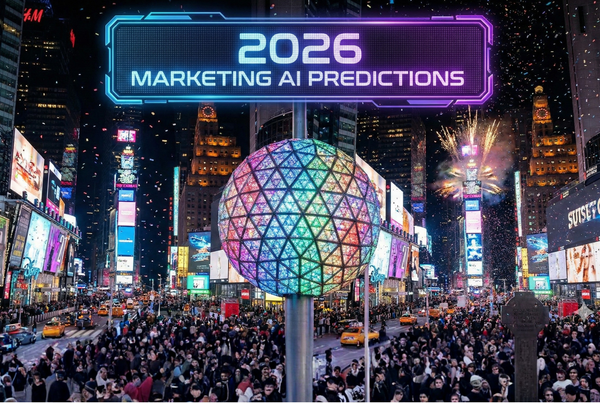The Rise of the Supermarketer
How AI is Forging the Next Evolution of Marketing, from the Decoding AI for Marketers Podcast

The marketing landscape has always been in flux, but the current wave of AI is a fundamental reshaping of the marketing profession itself. We're moving away from an era of hyper-specialization and into one where marketers are empowered to become strategic, multi-faceted leaders.
In a recent episode of the " Decoding AI for Marketers” podcast, hosts Greg Stuart and Rex Briggs sat down with Sandeep Menon, co-founder of Auxia, to explore this transformation and the emergence of the "supermarketer."
Here’s the episode, followed by what I found most interesting about their discussion.
The Evolution of Marketing: From Fragmentation to Convergence
For the last two decades, the digital landscape has pushed marketing teams toward increasing fragmentation. As new channels emerged, so did new specialists. Rex described this splintering effect: "you've got the growth hacker who's really specialized in this one specific channel of how to get the most out of Tik Tok... and that's different from the podcast expert". This created silos of expertise, making a unified strategy complex and difficult to execute.
AI is now acting as a powerful force for convergence. Sandeep calls this phenomenon "role compression," where AI agents and assistants empower a single person to accomplish tasks that previously required multiple people. The central idea is that AI can provide specialized expertise on demand. As Rex put it, imagine if you could "just pull that expertise like a package off a shelf in a supermarket".
This shift elevates the marketer from a narrow specialist to a broad, strategic generalist, capable of overseeing and integrating various functions without needing to be a hands-on expert in every single one.
The Supermarketer: An Architect of AI-Powered Strategy
So, what exactly is a "supermarketer"? The podcast defines them as those "who can do the jobs of many". This isn't about working harder; it's about working smarter by managing a team of AI agents, each with deep expertise. The marketer's role transforms from direct execution to that of an "expert, the manager of these expert agents".
Sandeep provided examples of how these agents are already at work:
- The Decision Agent: Traditionally, a lifecycle marketer would create a complex system of discrete rules to manage customer communication (e.g., "if a user does X, send email Y"). This approach is difficult to scale and maintain. A decision agent replaces this rigid system. It analyzes all available customer data to "determine what is the right action to promote to that user at a particular point in time to get them to the objective function that you're trying to optimize for".
- The Analyst Agent: A common frustration for marketers is the delay in getting deep insights from campaigns, often requiring "a team of data scientists to tell you what work, what didn't work". An analyst agent can "replicate the job of a marketing analyst," allowing marketers to get sophisticated insights simply by asking questions in natural language.
Crucially, the supermarketer's job is not to build these systems but to guide them. This means moving away from a deterministic, rules-based mindset to a probabilistic one. The marketer's new focus is on strategy, setting clear objectives and boundaries. As Sandeep explains, "The job of the marketer would be to determine what your strategies are define really good guard rails".
Where Marketing is Headed
The ultimate goal of this evolution is to finally deliver on a long-held promise: true personalization at scale. We have operated in a "one is to many" world for decades. Now, AI gives us the "ability now to kind of do one is to one at a large scale".
However, the path forward has its challenges, most of which are human, not technological.
- The Challenge of Change Management: The biggest hurdle is shifting the mindset of practitioners. There is a "certain comfort in setting rules... and letting go of that is not easy". Overcoming this requires education, identifying internal champions, and demonstrating success through pilot programs.
- The Need for Trust and Transparency: For marketers to cede control to AI, they need confidence in its decisions. This is why "transparency and controls" are critical. Sandeep emphasizes that systems must have "the explanability... to go back and understand why a specific decision was taken".
- Evolving Interfaces: Today's AI interfaces, like chatbots, are just the beginning. He uses the analogy of "horseless carriages" to describe them—early technology that mimics the old world. The future lies in AI becoming a true "companion" and "thought partner," proactively delivering value rather than just responding to prompts.
Marketers are the strategic conductors of an orchestra of AI agents, freed from tactical minutiae to focus on high-level goals, creativity, and customer value.





